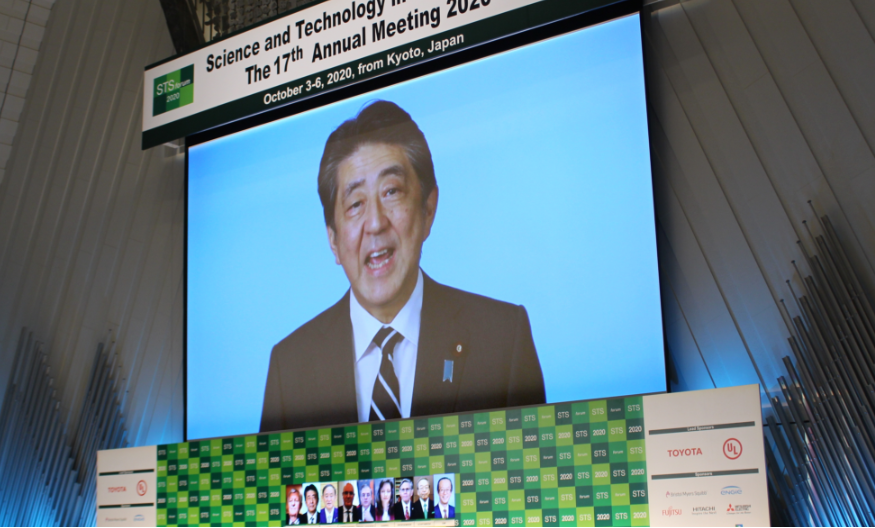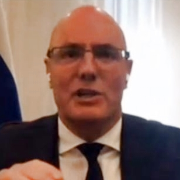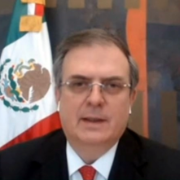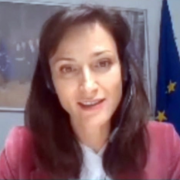
The 17th Annual Meeting of the Science and Technology in Society forum (STS forum) took place from October 3 to 6, 2020 live online from the Kyoto International Conference Center, with virtual participation of about 1,500 global leaders in science and technology, policymaking, business, and media from nearly 100 countries and regions, and 20 international organizations. There were 15 sessions in all, with 113 speakers from 37 countries, regions and international organizations.
The opening session, Science and Technology for the Future of Humankind, began with a speech by Mr. Shinzo Abe, former Prime Minister, Government of Japan; Honorary Chairman, STS forum. The session was then chaired by Dr. Henry A. McKinnell, Chairman, Moody's Corporation. A special message was also received from Mr. Yoshihide Suga, Prime Minister, Government of Japan, and delivered in lieu of Prime Minister Suga by Asako Omi, Member, House of Representatives, Japan.
-

Dr. Henry A. McKinnell
Chairman, Moody's Corporation; Chairman Emeritus, Pfizer Inc., U.S.A.
-

Mr. Yoshihide Suga
Prime Minister, Government of Japan
(Special Message)Photo of Prime Minister Suga: from Official Website of the Prime Minister of Japan and His Cabinet (https://www.kantei.go.jp/)
-

Mr. Shinzo Abe
former Prime Minister, Government of Japan; Honorary Chairman, STS forum, Japan

Among the speakers in this session was Mr. Dmitry Chernyshenko, Deputy Prime Minister, Russian Federation, who spoke of the unprecedented digital transformation taking place worldwide and Russia's initiatives in this regard. Russia is implementing a plan to digitalize public administration, social activities, and data infrastructure, with the aim of improving the quality of people's lives. Russia is also developing and implementing digital products, platforms, and solutions. In addition, Russia is advancing science and technology to anticipate and respond to other global challenges as well, such as the COVID-19 pandemic, and is ready to collaborate and share its experiences with the international community.
The session was also attended by Mr. Marcelo Luis Ebrard Casaubon, Secretary of Foreign Affairs, Government of Mexico, who shared the perspectives of the Community of Latin American and Caribbean States (CELAC) and discussed its collaboration with STS forum. Mexico is currently the President Pro-Tempore of CELAC, and CELAC has made innovation its priority for the year. CELAC and STS forum have been working together for 11 years and are organizing a dialogue among scientists, entrepreneurs, and policymakers to take place next year. The aim is to discuss ways to accelerate science and technology innovation, particularly in relation to COVID-19, and also how to build new and more equal societies once the pandemic is overcome.
In addition, Ms. Mariya Gabriel, Commissioner for Innovation, Research, Culture, Education and Youth, European Commission, highlighted the importance of research and innovation, and global cooperation in the face of the COVID-19 pandemic. This makes the annual meeting of STS forum as critical as ever. As history has shown, crises can make societies stronger, and it is hoped that the global community will emerge even stronger from the current crisis. For its part, the European Union is investing more in research and innovation, promoting stronger international cooperation, pursuing impact-oriented interdisciplinary research aimed at societal challenges, and fostering the next generation of scientists, including promoting gender equality.
Prof. Kelvin K. Droegemeier, Director of the Office of Science and Technology Policy, Executive Office of the President of the United States, also emphasized the importance of collaboration in science and technology, especially for overcoming the COVID-19 pandemic, and spoke about the United States and Japan's long history of cooperation in many critical fields, including infectious diseases, particle physics, neuroscience, space, cancer biology, and disaster resilience. Dr. Droegemeier also touched upon the essential role played by STS forum in bringing together researchers, policymakers, and business leaders from around the world and commended the holding of the annual meeting, despite the obstacles of the COVID-19 pandemic.
Mr. Takeshi Uchiyamada, Chairman of the Board, Toyota Motor Corporation, and Mr. Koji Omi, Founder and Chairman, STS forum, also attended the Opening Session and made their remarks.

Mr. Shinzo Abe at the Opening Session (on screen in the Main Hall, Kyoto International Conference Center)
-

Mr. Dmitry Chernyshenko
Deputy Prime Minister, Russian Federation
-

His Excellency Mr. Marcelo Luis Ebrard Casaubon
Secretary of Foreign Affairs, Government of Mexico
-

Ms. Mariya Gabriel
Commissioner for Innovation, Research, Culture, Education and Youth, European Commission, EU
-

Prof. Kelvin K. Droegemeier
Director of the Office of Science and Technology Policy, Executive Office of the President of the United States, U.S.A.
-

Mr. Takeshi Uchiyamada
Chairman of the Board, Toyota Motor Corporation; Chairman, Council on Competitiveness - Nippon (COCN), Japan
-

Mr. Koji Omi
Founder and Chairman, Science and Technology in Society forum (STS forum); former Minister of Finance, Japan
The overarching theme of this year's annual meeting was "The Role of Science and Technology in the Post COVID-19 Era," and there were four sessions with themes specifically tied to COVID-19. The first was Session 102 – Science and Technology in COVID-19 Pandemic, which was chaired by Dr. McKinnell and attended by special guests Dr. Anthony S. Fauci, Director, National Institute of Allergy and Infectious Diseases U.S.A., and Prof. Kathleen Hall Jamieson, Elizabeth Ware Packard Professor of Communication & Director of the Annenberg Public Policy Center, University of Pennsylvania.

Session 102 "Science and Technology in COVID-19 Pandemic"
From left to right, [Chair] Dr. Henry A. McKinnell, Chairman, Moody's Corporation; Chairman Emeritus, Pfizer Inc., U.S.A., Dr. Anthony S. Fauci, Director, National Institute of Allergy and Infectious Diseases (NIAID), U.S.A., Prof. Kathleen Hall Jamieson, Elizabeth Ware Packard Professor of Communication & Director of the Annenberg Public Policy Center, Annenberg School for Communication, University of Pennsylvania, U.S.A.

Dr. Anthony S. Fauci
Director, National Institute of Allergy and Infectious Diseases (NIAID), U.S.A.
The session's discussions centered on advances in understanding and treating COVID-19, including the ongoing development of vaccines, as well as ways to most effectively communicate the related scientific information to the public and gain its trust. Dr. Fauci underlined the importance of improving scientific literacy through education and scientific communication, in particular the need for society to understand that science is not a linear process, but a series of successes and failures that scientists build upon. Community outreach will also be necessary to build trust among communities that are skeptical of medical science and to ensure the rapid deployment of any future effective vaccines. Asked by Dr. McKinnell for medical advice for protecting oneself from COVID-19, Dr. Fauci first advocated good public health practices, namely wearing masks, social distancing, avoiding crowds, doing activities outdoors rather than indoors, and washing hands. He also recommended looking after personal health, including good sleep, good nutrition, avoiding stress, and avoiding excess.
The second COVID-19-related session was Session 202 – Global Health: Lessons from New Coronavirus Crisis. Among the speakers was Prof. George Fu Gao, Director-General, Chinese Center for Disease Control and Prevention, who talked about the unprecedented nature of the COVID-19 pandemic and the lessons that could be learned from it. The world was not ready for this pandemic, which emerged because of human behavior. The COVID-19 crisis has highlighted the need for scientists to work together and share information, the need for humankind to respect nature, and the importance of preventing or correcting misinformation. Furthermore, the health security and wellbeing of all countries and their people are interconnected. Therefore, to overcome the current crisis, the world needs solidarity and to work in unison.
Another such session was Session 203 – Improving Preparedness for Pandemic Diseases: the Role of S&T. During the session, Mr. Thomas Cueni, Director General, International Federation of Pharmaceutical Manufacturers & Associations, shared five lessons from the COVID-19 pandemic: the fact that the pharmaceutical industry had to understand that this is not business as usual; the importance of translational research and applying basic research into scalable solutions and treatments, exemplified by mRNA technology for COVID-19 vaccines; the continued need to rely on new and better treatment options, particularly translational research on monoclonal antibodies, with a similar potential for use in future pandemics as mRNA vaccines; the importance of basic science; and the significance of institutional partnerships for pandemic preparedness involving the private sector early on. Mr. Cueni also highlighted the strengths of industry, particularly its knowhow and skillsets for researching, developing, and manufacturing, at scale, tests, treatments and vaccines, and the role of regulatory agencies in maintaining the quality of tests and treatments.
The session was also attended by Prof. Shinya Yamanaka, Nobel Laureate in Physiology or Medicine (2012) and Director and Professor, Center for iPS Cell Research and Application, Kyoto University, who shared an analysis of different countries' policies and strategies to combat COVID-19. The main differences in each country's response have been the level of stringency and the testing capacity. Interestingly, Japan took a relatively mild policy and had relatively limited testing capacity, and yet it is suffering a much lower number of deaths. There may be some unknown factor that can explain this discrepancy. Countries and scientists should work together to study this and other subjects that may offer ideas for how to overcome the common threat of COVID-19.
The final COVID-19-related session was Session 303 – Shaping the Post COVID-19 Society. Ms. Michelle Bachelet, United Nations High Commissioner for Human Rights, was among the speakers. She discussed society's dependence on digital technology, as underscored by the COVID-19 crisis, and how to turn the crisis into an opportunity. By learning the lessons from this pandemic, the world can rebuild society better than before. Although COVID-19 can infect anyone, it predominantly affects the most vulnerable. When building back society, efforts should be made to address various inequalities. For example, the pandemic has brought into sharp relief the digital divide. Societies should guarantee not only human rights and freedoms, but also access to digital technologies. Universal access to resilient healthcare without discrimination should also be ensured.

Session 203 “Improving Preparedness for Pandemic Diseases: the Role of S&T”
[Chair] Prof. Harriet Wallberg, Professor and former President, Karolinska Institutet, Sweden, Dr. Chien-Jen Chen, Academician / Distinguished Research Fellow, Genomics Research Center, Academia Sinica, Taiwan, Mr. Thomas Cueni, Director General, International Federation of Pharmaceutical Manufacturers & Associations (IFPMA), Switzerland, Dr. Margaret A. Hamburg, former Commissioner, US Food and Drug Administration (FDA); Immediate past Board Chair/President, American Association for the Advancement of Science (AAAS), U.S.A., Prof. Sari Hanafi, President, International Sociological Association; Professor, Department of Sociology, Anthropology & Media Studies, American University of Beirut, Lebanon, Mr. Emmanuel Ligner, CEO, Cytiva, U.K., Prof. Chorh Chuan Tan, Chief Health Scientist, Ministry of Health (MOH); Executive Director, MOH Office for Healthcare Transformation, Singapore, Professor Shinya Yamanaka, Director and Professor, Center for iPS Cell Research and Application (CiRA) Kyoto University, Japan [Nobel Laureate 2012 (Physiology or Medicine)]
-

Prof. George Fu Gao
Director-General, Chinese Center for Disease Control and Prevention, China
-

Mr. Thomas Cueni
Director General, International Federation of Pharmaceutical Manufacturers & Associations (IFPMA), Switzerland
-

Prof. Shinya Yamanaka
Director and Professor, Center for iPS Cell Research and Application (CiRA) Kyoto University, Japan [Nobel Laureate 2012 (Physiology or Medicine)]
-

Ms. Michelle Bachelet
United Nations High Commissioner for Human Rights, Office of the High Commissioner for Human Rights (OHCHR), Switzerland
Besides COVID-19, the other sessions covered wide-ranging themes such as sustainability, science policy, inclusive participation, and AI. On the first day, there was Session 101 – Sustainable Society, which was attended by Dr. Mario J. Molina, Nobel Laureate in Chemistry (1995) and President, Mario Molina Center for Strategic Studies on Energy and the Environment in Mexico. The members of STS forum were deeply saddened to learn that Dr. Molina later passed away on October 7, local time, and wish to hereby express our sincere condolences on his passing. During the session, the late Dr. Molina spoke passionately about the fundamental importance of ensuring the sustainability of the planet, particularly tackling climate change. Echoing his sentiments was Mr. Terry Brady, President and CEO, Underwriters Laboratories Inc., who called on researchers, policymakers, and industry leaders to work together to accelerate scientific and technological development to build a more resilient society, and emphasized the importance of safety to achieving sustainability.
-

Dr. Mario J. Molina
President, Mario Molina Center for Strategic Studies on Energy and the Environment, Mexico; Professor, Department of Chemistry and Biochemistry, University of California, San Diego (UCSD), U.S.A. [Nobel Laureate 1995 (Chemistry)]
-

Mr. Terry Brady
President and CEO, Underwriters Laboratories Inc., U.S.A.
-

Ms. Karen Andrews
Minister for Industry, Science and Technology, Ministry for Industry, Science and Technology, Australia
-

Dr. Ilham Kadri
Chief Executive Officer, Solvay, Belgium
-

Dr. Fabiola Gianotti
Director General, European Organization for Nuclear Research (CERN), Switzerland
-

Prof., Dr. Erwin Neher
Research Director, Emeritus, Department of Membrane Biophysics, Max Planck Society, Germany [Nobel Laureate 1991 (Physiology or Medicine)]
-

Dr. Sudip S. Parikh
Chief Executive Officer, American Association for the Advancement of Science (AAAS), U.S.A.
The second day included Session 200 – Science and Technology Education for Society and Session 201 – Science and Technology in Business. In the former, Ms. Karen Andrews, Minister for Industry, Science and Technology, Australia, emphasized the importance of education in science, technology, engineering, and mathematics (STEM) fields, and also the value of the STEM-educated workforce, believing science and technology to be key to the future prosperity and wellbeing of society. In the latter, Dr. Ilham Kadri, Chief Executive Officer, Solvay, expressed the belief that no company will have a future if it does not raise the bar on sustainability, calling sustainability businesses' license to operate, and that there is no sustainability without chemistry.
The first session of day three was Session 300 – Cooperation and Collaboration in Science and Technology. During the session, Prof. Fabiola Gianotti, Director General, European Organization for Nuclear Research, spoke of the inherent multilateral nature of science, its role as a tool for innovation, and its unifying nature, while Prof. Dr. Erwin Neher, Nobel Laureate in Physiology or Medicine (1991) and Research Director, Emeritus, Department of Membrane Biophysics, Max Planck Society, discussed the conflict between cooperation and competition in science and technology, and argued for the benefits of cooperation, particularly in the present situation surrounding the COVID-19 crisis.
In the following session, Session 301 – Global Governance of Information, Dr. Sudip S. Parikh, Chief Executive Officer, American Association for the Advancement of Science (AAAS), reported on AAAS' current efforts to convey scientific findings and news to the public quickly and accurately, and explained how the pandemic has revealed that it is not enough for scientists alone to be communicating about their findings. In addition, Dr. Leila Zia, Head of Research, Wikimedia Foundation, spoke about the global governance of knowledge and the stakeholders involved in constructing and accessing knowledge, and shared the editing, transparency, credibility, and consensus-building processes employed by Wikipedia. Meanwhile, in Session 302 – Basic Science, Innovation and Policy, Dr. Sethuraman Panchanathan, Director, National Science Foundation, expressed the belief that decades of investment in basic research had led to discoveries that have supported the current fight against COVID-19, such as advances in mathematics, computation, data science, and mobile phone technology enabling scientists to track and model the disease, and called for expanded investment and continued international collaboration.
-

Dr. Leila Zia
Head of Research, Wikimedia Foundation, U.S.A.
-

Dr. Sethuraman Panchanathan
Director, National Science Foundation (NSF), U.S.A.
-

Dr. Chris Fall
Director, Office of Science, U.S. Department of Energy (DOE), U.S.A.
-

Dr. Bernard Bigot
Director-General, ITER Organization, France
-

Prof. Dr. Ada E. Yonath
Director of The Helen and Milton A. Kimmelman Center for Biomolecular Structure and Assembly, Weizmann Institute of Science, Israel [Nobel Laureate 2009 (Chemistry)]
-

Prof. Yoshua Bengio
Scientific Director, Mila - Quebec AI Institute; Full Professor, Computer Science and Operations Research, University of Montreal, Canada
The fourth day was opened with Session 400 – Energy and Environment, during which Dr. Chris Fall, Director, Office of Science, U.S. Department of Energy, pointed out that while the pandemic has brought sickness and death, it has also shown glimpses of a possible brighter future, with interruptions to economic activities bringing cleaner air to many regions, and new ways of working and living that may be more efficient. Another speaker in the session was Dr. Bernard Bigot, Director-General, ITER Organization, who talked about the disruption caused by the COVID-19 pandemic to ITER, the international fusion research project, and how the stakeholders have been working to overcome it with collaboration, trust, and planning.
This was followed by Session 401 – Promoting Inclusive Participation in Science and Technology. In the session, Prof. Dr. Ada E. Yonath, Nobel Laureate in Chemistry (2009) and Director of The Helen and Milton A. Kimmelman Center for Biomolecular Structure and Assembly, Weizmann Institute of Science, spoke about inclusive participation at the Weizmann Institute of Science, and commented on the importance of promoting excellence when implementing gender diversity measures, as well as the need to educate society. Next, in Session 402 – AI and Society, Prof. Dr. Yoshua Bengio, Scientific Director, Mila - Quebec AI Institute, discussed the potential of artificial intelligence to be used to enhance social good in fields such as healthcare, agriculture, education, and environment, while also cautioning that the risk of its misuse has also grown as it has spread to broader society.
The closing session was chaired by Dr. Marcia McNutt, President, National Academy of Sciences, U.S.A. The speakers were Prof. Andrew Zachary Fire, Professor, Departments of Pathology and Genetics, Stanford University School of Medicine; Dr. Ir. Hammam Riza, President, Agency for the Assessment and Application of Technology; Prof. Hiroshi Komiyama, Chairman, Mitsubishi Research Institute, Inc.; and Dr. Ismail Serageldin, Founding Director Emeritus, The Library of Alexandria. Dr. McNutt noted that, with this year's annual meeting of STS forum being held amid the COVID-19 pandemic, particular focus has been devoted to sustainability. The crisis has emphasized the need for a sustainable healthcare system, sustainable economies, sustainable educational institutions, and a sustainable society. The pandemic has also revealed disproportionate impacts on different segments of society, thereby increasing inequality that is incompatible with a healthy, sustainable society. In this context, STS forum is addressing the correct questions and its discussions have informed thinking on building a more enduring resilient society.
-

Dr. Marcia McNutt
President, National Academy of Sciences, U.S.A.
The 18th Annual Meeting of STS forum is scheduled to be held online from Kyoto from Saturday, October 2, to Tuesday, October 5, 2021.

